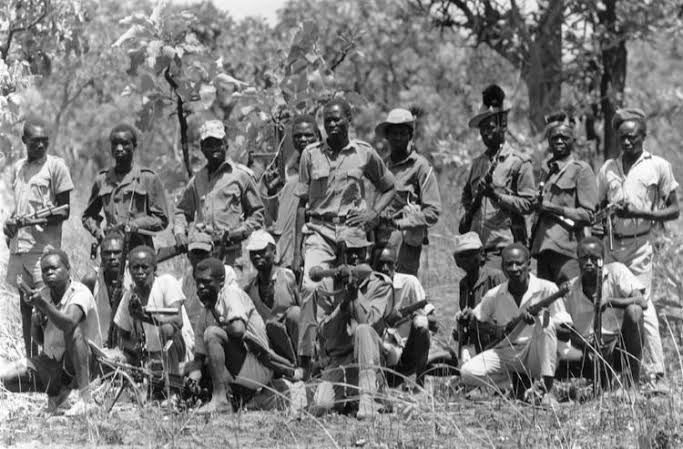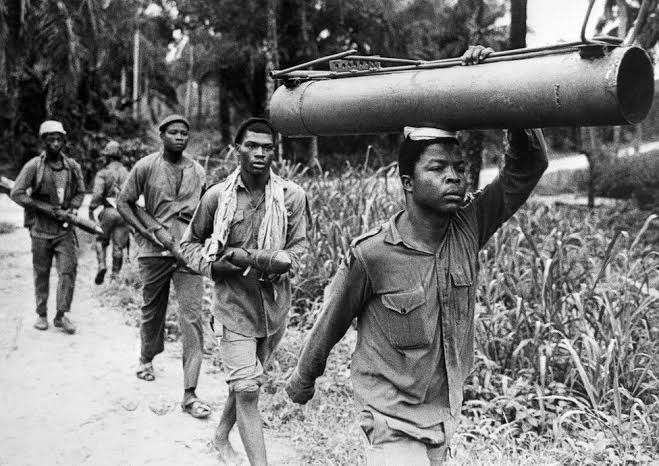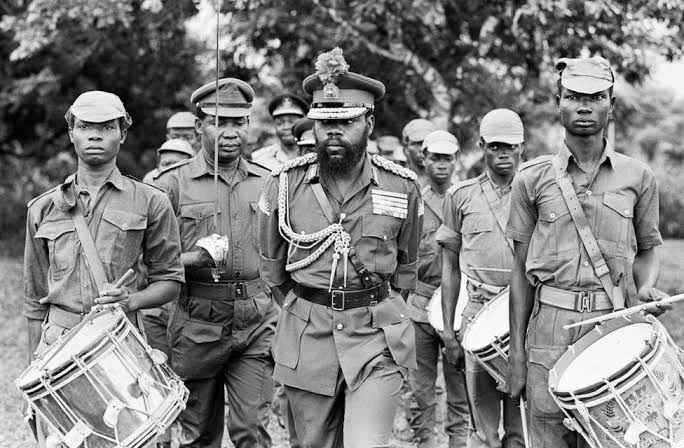
African Civil Wars #Thread
A Nation is "A large body of people united by common descent, history, culture, or language, inhabiting a particular country or territory". This definition doesn't matter to the Imperialists resulting to the death of millions of Africans

A Nation is "A large body of people united by common descent, history, culture, or language, inhabiting a particular country or territory". This definition doesn't matter to the Imperialists resulting to the death of millions of Africans


1. Sudan Civil War
Modern Sudan was birthed on 1 January 1956. Prior to that, the occupying forces, Britain and Egypt, merged Northern Sudan and Southern Sudan in 1946. The South wasn’t a party to the discussions.
Modern Sudan was birthed on 1 January 1956. Prior to that, the occupying forces, Britain and Egypt, merged Northern Sudan and Southern Sudan in 1946. The South wasn’t a party to the discussions.

Both regions were very different in culture and religion, and were previously governed separately. Yet in 1953 Britain and Egypt agreed to grant the monolithic Sudan independence. 



By August 1955, four months before the ceremonial independence of 1956, civil war between soldiers from the South seeking regional autonomy and the central government in Khartoum begun. The war lasted for more than 16 years and over 2 million people died during the war. 

2. Nigeria Civil War
Nigeria gained independence in 1960, seven years later the civil war also known as the Biafra War started, from 6 July 1967 to 15 January 1970.
Nigeria gained independence in 1960, seven years later the civil war also known as the Biafra War started, from 6 July 1967 to 15 January 1970.

All regions have different culture and religion, and were previously governed separately by their Monarch. Yet in 1960 Britain agreed to grant the monolithic Nigeria independence not considering their differences. 



Some of the immediate causes of the war were the 15 January 1966 coup, counter coup in July 28 1966, and the subsequent mass murders of Easterners (mainly Igbos) in Northern Nigeria. 

After the rejection of the Aburi Accord (Confederation) by Gen Gowon the Republic of Benin was first established in the then Mid-Western Nigeria now Edo and Delta, the republic was short-lived. 

Meanwhile the Eastern Region leader Gen Ojukwu also established the Republic of Biafra which cause a war between the Eastern Region against the British and Nigeria and Over 2.5 million people died during the war. 

3. Uganda Civil Wars
In 1894 the area which is now Uganda became a British protectorate. Shortly after, the British signed an agreement with Buganda, making it a constitutional monarchy.
In 1894 the area which is now Uganda became a British protectorate. Shortly after, the British signed an agreement with Buganda, making it a constitutional monarchy.

Buganda kingdom dates back to the 14th century, it is the largest kingdom in Uganda, and constitutes about 16% of the population. In 1967 the monarchy was abolished. What ensued afterwards was a mesh of coups, of intra and inter-country wars, and plain horror from 1971 to 1986. 





Under the present government, judging by its modern history, Uganda has been relatively peaceful. Though from the 90s till date, there has been an ongoing war with rebels of the Lord Resistant Army. 500,000 people died.
Pic 📸 US Army arriving to take side during the Civil war.
Pic 📸 US Army arriving to take side during the Civil war.

4. Rwanda Civil War
Rwanda gained independence from Belgium on 1 July 1962. Prior to that, a referendum was held to determine if the monarchical system of government which had existed since the 18th century should be retained.

Rwanda gained independence from Belgium on 1 July 1962. Prior to that, a referendum was held to determine if the monarchical system of government which had existed since the 18th century should be retained.


The results were overwhelmingly against keeping the Tutsi monarchy in an independent Rwanda. In 1959 the so called Rwanda Revolution happened, which led to the majority Hutu taking charge of the newly formed republic. 



The violence from the Revolution made refugees of thousands of Rwandans, most of them Tutsis. On 1 October 1990 the Rwandan Patriotic Front (RPF), mostly Tutsi refugees who had fled to Uganda, launched an attack on Rwanda and began a war which ended temporarily in 1993. 

But in 1994 when a rocket shot down the plane carrying Presidents of Burundi and Rwanda, killing them both, the war started afresh and led to the Tutsi genocide leading to the death of Over 1.5 million people. 

5. Liberia Civil Wars
When the 1980 coup happened, Liberia had been a republic for over 100 years. The coup unsettled the previously peaceful country and created the actors, the environment for the civil war which started in 1989 and ended in 2003 and over 250,000 people died.

When the 1980 coup happened, Liberia had been a republic for over 100 years. The coup unsettled the previously peaceful country and created the actors, the environment for the civil war which started in 1989 and ended in 2003 and over 250,000 people died.


6. Mozambique Civil War
Unlike most African countries, Mozambique gained independence in 1975 through an armed conflict with Portugal. The war started on 25 September 1964 and ended 8 September 1974.
Unlike most African countries, Mozambique gained independence in 1975 through an armed conflict with Portugal. The war started on 25 September 1964 and ended 8 September 1974.

Two years after the war for independence, civil war between the ruling government and Mozambique Resistance Movement (RENAMO) started. Though that war ended in 1992, since 2013 there has been a resurgence of RENAMO militancy and Over 1 million people died during the war. 

7. South Sudan Civil War
A country of people with similar cultures has been won, peace should reign, right? Wrong. In 2013, fighting broke out between Sudan People Liberation Movement (SPLM), the ruling party, and Sudan People Liberation Movement-In Opposition (SPLM-IO).
A country of people with similar cultures has been won, peace should reign, right? Wrong. In 2013, fighting broke out between Sudan People Liberation Movement (SPLM), the ruling party, and Sudan People Liberation Movement-In Opposition (SPLM-IO).

Peace talks between both groups have now broken down twice, and the United Nations Commission on Human Rights has warned that if something isn’t done by the international community there’s a possibility of another Rwanda happening and during the war over 400,000 people died.
Follow @Africa_Archives
Their are other civil wars that happened quote the first tweet with other civil wars that happened
• • •
Missing some Tweet in this thread? You can try to
force a refresh














